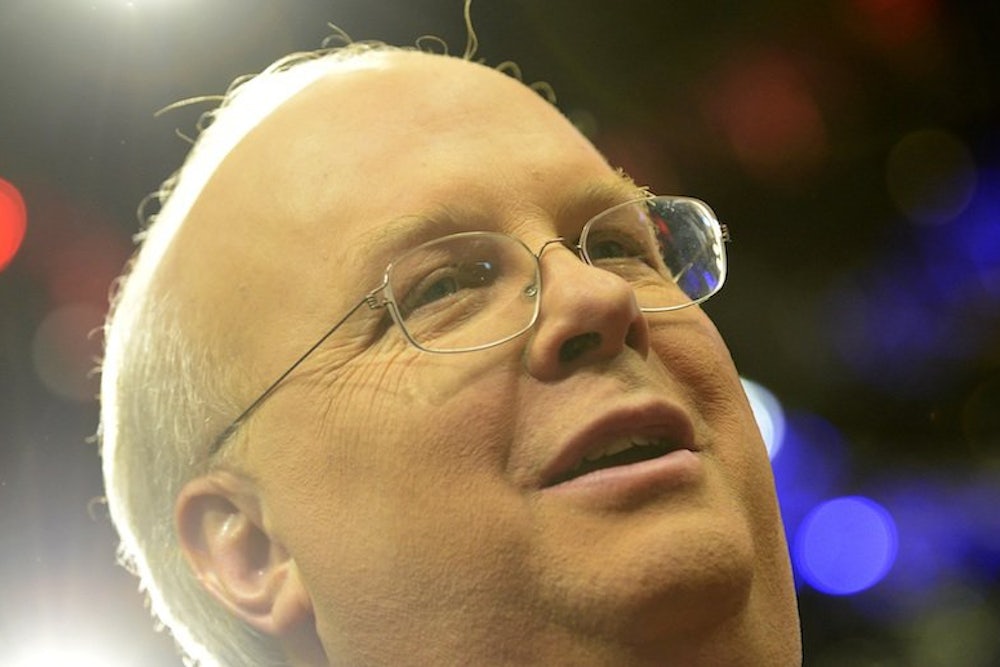Karl Rove's bizarre denial after Fox News projected Ohio for President Barack Obama was the only election-night performance worse than American Crossroads'. His super PAC distributed more than $175 million to 30 candidates, of whom 21 lost, despite ample opportunities to take down vulnerable Democrats, like Claire McCaskill, or win open seats, like Dick Lugar's in Indiana. You'd think that such a miserable showing in last year's election would dissuade donors from giving more money to Rove, but instead Rove is launching a new money machine, the Conservative Victory Project, aimed to defeat irreparably flawed candidates like Todd Akin and Richard Mourdock. On its face, the new organization might seem to bode poorly for the Democratic Party, which has relished defeating the far-right candidates emerging from the GOP primary circus. But Democrats ought to welcome Rove's latest pet project, as it seems more likely to bite the party it aims to boost.
There's no question that Republican primaries have hurt the party's general election chances. Christine O'Donnell, Sharron Angle, Ken Buck, Todd Akin, and Richard Murdock all might have cost Republicans winnable Senate seats—as well as control of the Senate in the 2010 midterms. The 2012 presidential primaries demonstrated the reluctance of Republican primary voters, which tend to be more conservative, to warm to candidates with deficient conservative credentials. For the Republican primaries, Mitt Romney Etch-a-Sketched his moderate past and embraced every plank of the conservative agenda, and still it took him months of mud-slinging to defeat his more authentically conservative—and authentically disorganized, underfunded—competitors.
So why are relatively moderate Republicans struggling to defeat conservative primary challengers? It's not for lack of money, that's for sure. After all, Dick Lugar, Mike Castle, and John Brunner each lost decisively despite outspending Richard Mourdock, Christine O'Donnell, and Todd Akin. Instead, moderates are losing simply because, well, they're moderates—and the GOP these days is anything but. That's the simple explanation, anyway. The truth is slightly more complex: There's nothing like a severely conservative alternative to make an establishment candidate, however conservative he or she is, seem like a party lapdog. So long as GOP primary voters prefer ultraconservatives to party-approved candidates, it's hard to imagine that Rove's millions will make a discernible difference—especially if his organization triggers counterattacks from conservative donors, which may well be in the planning stages already.
If money isn't helping the GOP's favored candidates, then is it hurting? In the Conservative Victory Project's case, it just might. The CVP is already perceived as an effort to promote moderate, beltway Republicans at the expense of grassroots, tea party–backed conservatives, even though that's not the stated intention of Rove's effort. If Republican candidates are less likely to prevail in conservative primaries once they're branded as a moderate, then a Republican might suffer from association with an organization perceived as moderate and pro-establishment. Conversely, staring down Karl Rove could turn into a badge of honor for tea party–backed conservatives, earning free media attention and perhaps even legitimizing the candidacy of a tea party candidate among the grassroots, movement conservatives that dominate Republican primaries. Many believe the National Republican Senate Committee's (NRSC) efforts to promote mainline candidates in Colorado and Delaware backfired for similar reasons.
The NRSC learned its lesson and stayed out of competitive primaries in 2012. Not that it made a difference: Mourdock and Akin still won. The Republican Party hasn't found a cure-all for its primary problem, but Rove's new super PAC isn't a solution. While Rove is right that candidates like Mourdock and Akin hurt his record in 2012, it's not like establishment-friendly Republicans fared much better. In fact, they lost nearly every competitive Senate race, many of which were ripe for picking. So Rove would be better off reflecting on what went wrong in 2012, rather than building yet another money machine that threatens to deliver a similar performance in 2014.
